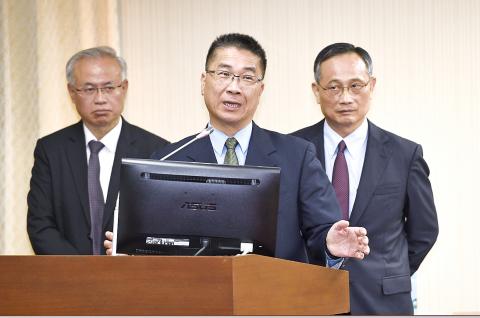The US supports Taiwan’s meaningful participation in international organizations, including Interpol, a US Department of State spokesperson said on Tuesday.
The spokesperson made the statement after Taipei said that it was asking friendly nations to speak up at an Interpol executive committee meeting to support Taiwan’s participation at Interpol’s general assembly that opens on Nov. 16 in Dubai, United Arab Emirates.
The spokesperson said Washington supports Taiwan’s participation in international organizations whether or not they require statehood.

Photo: George Tsorng, Taipei Times
“In organizations that require statehood for membership, the US supports Taiwan’s meaningful participation. This includes the ICAO [International Civil Aviation Organization], Interpol, WHO and the more than 60 international organizations in which Taiwan participates,” the spokesperson said.
The Criminal Investigation Bureau (CIB) on Monday said that it sent a letter to ask that it participate as an observer at the Interpol assembly.
Ministry of Foreign Affairs Department of International Organizations Director-General Bob Chen (陳龍錦) on Tuesday said that Interpol had received the letter sent by CIB Commissioner Tsai Tsan-po (蔡蒼柏) last month, but has yet to respond.
Minister of the Interior Hsu Kuo-yung (徐國勇) yesterday told lawmakers that Taiwan’s participation in the assembly would be beneficial for China.
Asked by Democratic Progressive Party (DPP) Legislator Liu Shih-fang (劉世芳) whether former Interpol president and Chinese Deputy Minister of Public Security Meng Hongwei (孟宏偉) being under investigation would give Taiwan a better chance of attending the assembly, Hsu, who was appearing at the Legislative Yuan to report on the government’s drug policy, said the government is trying very hard to make that happen.
The Department of State’s expression of support for Taiwan’s participation was a strong boost for the nation’s effort to attend the assembly, he said.
Asked by People First Party Legislator Chen Yi-chieh (陳怡潔) whether the government has received a response from Interpol, Hsu said it has not.
China’s obstruction is the only thing preventing Taiwan from taking part in the assembly, he said, adding that it has a great effect on global efforts to fight crime, such as the smuggling of illegal drugs.
Blocking Taiwan from participating in the assembly does not benefit the investigation of cross-border crimes in any way, he said.
More than 70 percent of illegal drugs circulating in Taiwan originate in China, he said.
He urged Beijing to allow Taiwan to join Interpol, adding that doing so would be helpful for maintaining peace around the world.
Asked by Liu whether a mechanism is in place for cross-strait cooperation against crime, National Police Agency Director-General Chen Ja-chin (陳家欽) said that while the two sides are still cooperating on individual cases, these instances have become fewer.
The cases on which Taiwan and China are working more closely are fraud cases, which affect the property and safety of Taiwanese and Chinese, he said.
The two sides have also been working together in the fight against illegal drugs, he added.

NATIONAL SECURITY THREAT: An official said that Guan Guan’s comments had gone beyond the threshold of free speech, as she advocated for the destruction of the ROC China-born media influencer Guan Guan’s (關關) residency permit has been revoked for repeatedly posting pro-China content that threatens national security, the National Immigration Agency said yesterday. Guan Guan has said many controversial things in her videos posted to Douyin (抖音), including “the red flag will soon be painted all over Taiwan” and “Taiwan is an inseparable part of China,” while expressing hope for expedited “reunification.” The agency received multiple reports alleging that Guan Guan had advocated for armed reunification last year. After investigating, the agency last month issued a notice requiring her to appear and account for her actions. Guan Guan appeared as required,

A strong cold air mass is expected to arrive tonight, bringing a change in weather and a drop in temperature, the Central Weather Administration (CWA) said. The coldest time would be early on Thursday morning, with temperatures in some areas dipping as low as 8°C, it said. Daytime highs yesterday were 22°C to 24°C in northern and eastern Taiwan, and about 25°C to 28°C in the central and southern regions, it said. However, nighttime lows would dip to about 15°C to 16°C in central and northern Taiwan as well as the northeast, and 17°C to 19°C elsewhere, it said. Tropical Storm Nokaen, currently

PAPERS, PLEASE: The gang exploited the high value of the passports, selling them at inflated prices to Chinese buyers, who would treat them as ‘invisibility cloaks’ The Yilan District Court has handed four members of a syndicate prison terms ranging from one year and two months to two years and two months for their involvement in a scheme to purchase Taiwanese passports and resell them abroad at a massive markup. A Chinese human smuggling syndicate purchased Taiwanese passports through local criminal networks, exploiting the passports’ visa-free travel privileges to turn a profit of more than 20 times the original price, the court said. Such criminal organizations enable people to impersonate Taiwanese when entering and exiting Taiwan and other countries, undermining social order and the credibility of the nation’s

‘SALAMI-SLICING’: Beijing’s ‘gray zone’ tactics around the Pratas Islands have been slowly intensifying, with the PLA testing Taiwan’s responses and limits, an expert said The Ministry of National Defense yesterday condemned an intrusion by a Chinese drone into the airspace of the Pratas Islands (Dongsha Islands, 東沙群島) as a serious disruption of regional peace. The ministry said it detected the Chinese surveillance and reconnaissance drone entering the southwestern parts of Taiwan’s air defense identification zone early yesterday, and it approached the Pratas Islands at 5:41am. The ministry said it immediately notified the garrison stationed in the area to enhance aerial surveillance and alert levels, and the drone was detected in the islands’ territorial airspace at 5:44am, maintaining an altitude outside the effective range of air-defense weaponry. Following